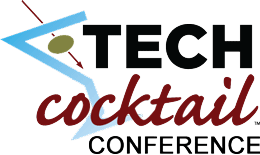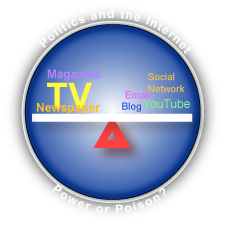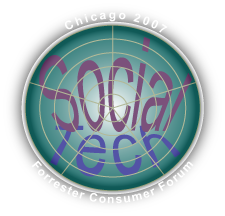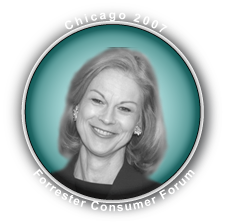Reexamining “Content” in Light of “Conversation”
 Web 2.0 is redefining content on the Web, and Duo Consulting’s and Content Wrangler’s Web Content 2008 Chicago, convened at the UBS Tower on June 17-18, 2008, was a rich opportunity to check in with the Web 1.0-Web 2.0 mashup. Embedded within the legacy concept of “content” (text, pictures, audio, video, etc.) is that few people create it and many people consume it, which is obviously less true with every passing month. Web 2.0 is redefining content on the Web, and Duo Consulting’s and Content Wrangler’s Web Content 2008 Chicago, convened at the UBS Tower on June 17-18, 2008, was a rich opportunity to check in with the Web 1.0-Web 2.0 mashup. Embedded within the legacy concept of “content” (text, pictures, audio, video, etc.) is that few people create it and many people consume it, which is obviously less true with every passing month.
Something else is happening on the way to the forum, too: opinions about content are gaining more attention than the content itself, according to Day One keynote Dick Costolo. If so, where does that leave people who “manage” content? There is a whole ecosystem of professionals and vendors that manage content according to Web 1.0 rules, and many of them were here, sharing their visions and tactics for embracing Web 2.0. Day Two keynote Jerome Nadel provided a clue: a shift in emphasis to design: since “users” are creating the opinion content through their “conversation,” I’ll hazard that a key part of […]
Knowledge Economy Unfolds via All Things Digital-Social—Wearing Passion and Personality on Your Sleeve
Discerning Web 2.0 from Web 1.0—Ron May Gets Comeuppance as Happy and Successful
 Web 2.0 entrepreneurs, financiers and professional services folk descended on Loyola University Chicago’s Lewis Hall 29 May 2008 for “Tech Conference,” TechCocktail’s first ever day-long educational event. Founders Frank Gruber and Eric Olson served an effervescent yet heady elixir of heart-to-heart war stories, lessons learned and strategies by entrepreneurs, venture capitalists, lawyers, accountants and an executive coach. Web 2.0 entrepreneurs, financiers and professional services folk descended on Loyola University Chicago’s Lewis Hall 29 May 2008 for “Tech Conference,” TechCocktail’s first ever day-long educational event. Founders Frank Gruber and Eric Olson served an effervescent yet heady elixir of heart-to-heart war stories, lessons learned and strategies by entrepreneurs, venture capitalists, lawyers, accountants and an executive coach.
Since attending TechCocktail 1 in July 2006, I have promoted the periodic TechCocktail “meetups” to everyone who will listen as the place to learn about and connect with Web 2.0 players and technology in Chicago (elsewhere now, too). Frank and Eric have created one of the most worthwhile groups and communities in the city and were recognized in the ITA’s Citylights this year. Their first conference was both high value and quintessentially Web 2.0: speakers were open about what had worked and what hadn’t. The program was well balanced, organized and entertaining. There were considerable lessons for […]
IBM Drives Enterprise Adoption of Social Networks with New Enterprise Adaptability Practice offers reportage on the launch of IBM’s enterprise adaptability practice
Shades of Web 3.0—The Googlization of Knowledge Management—Resetting the Adoption Clocks
 Tuesday IBM announced a new services practice, “Enterprise Adaptability” services, which aims to help global companies realize a quantum leap in workforce agility and collaboration by facilitating their adoption of social networks and Web 2.0. As predicted in the Year in Review—2007, social networks and Web 2.0 are being embraced in the enterprise B2B arena this year, and this announcement shows that adoption is right on ahead of schedule. Enterprise 2.0 is reaching the mainstream, and companies that do not aggressively adopt enterprise 2.0 will experience serious competitive threats within three years. Tuesday IBM announced a new services practice, “Enterprise Adaptability” services, which aims to help global companies realize a quantum leap in workforce agility and collaboration by facilitating their adoption of social networks and Web 2.0. As predicted in the Year in Review—2007, social networks and Web 2.0 are being embraced in the enterprise B2B arena this year, and this announcement shows that adoption is right on ahead of schedule. Enterprise 2.0 is reaching the mainstream, and companies that do not aggressively adopt enterprise 2.0 will experience serious competitive threats within three years.
IBM’s announcement validates enterprise social networking, but more significant is their rationale for launching the practice: their clients are struggling with adjusting to the Knowledge Economy, globalization and decreasing margins, and Enterprise Adaptability prescribes collaboration and innovation to cure legendary agility gaps. As explained below, Enterprise Adaptability smells like breakthrough, although it’s barely out of the oven. To look behind the curtain, I caught up with […]
Web 2.0 Impact on 2008 U.S. Presidential Election Declared Minimal at Executives’ Club, but cantankerous subtext hints at possible monkey wrench—democratic race in spotlight.
 The Executives’ Club of Chicago fielded an expert panel to brief Midwest executives on Web 2.0’s current and likely impact on one of the most watched U.S. elections in recent history. Marie Cocco, a renowned political columnist, Peter Greenburger, Director of Google’s Elections & Issue Advocacy Team, and Alan Webber, Senior Analyst of Forrester Research brought to bear diverse perspectives on the question at the event, which took place at The University Club on January 31, 2008. The Executives’ Club of Chicago fielded an expert panel to brief Midwest executives on Web 2.0’s current and likely impact on one of the most watched U.S. elections in recent history. Marie Cocco, a renowned political columnist, Peter Greenburger, Director of Google’s Elections & Issue Advocacy Team, and Alan Webber, Senior Analyst of Forrester Research brought to bear diverse perspectives on the question at the event, which took place at The University Club on January 31, 2008.
They produced a logical conclusion, namely that Web 2.0 was a force in the making but that it would probably not be a decisive factor this year. The session was graciously co-hosted by Communications Committee Co-Chairs David Prosperi, Vice President Global Public Relations, AON and David Blake, Publisher of Crain’s Chicago Business.
As usual, I will share my notes of speakers’ remarks before adding my between the lines analysis and conclusions. As an […]
Year in Review 2007—Editor’s Choice of the Global Human Capital Journal
 As I reflect on 2007 and create strategy for 2008, several macro-trends come into sharp relief, and I believe that some of them might be helpful to you as you conduct your own planning. As always, I focus on emerging phenomena because they are areas in which disruption and discontinuous change are acting on markets, thereby elevating threats and opportunities. Helping leaders to create strategy to manage the risk of unusual market developments is the focus of my consulting practice. As I reflect on 2007 and create strategy for 2008, several macro-trends come into sharp relief, and I believe that some of them might be helpful to you as you conduct your own planning. As always, I focus on emerging phenomena because they are areas in which disruption and discontinuous change are acting on markets, thereby elevating threats and opportunities. Helping leaders to create strategy to manage the risk of unusual market developments is the focus of my consulting practice.
In 2007 it became clear to me that we were entering a profound social transformation that would produce an unimaginable degree of change. Unlike the technology-precipitated change that I’ve been helping people with since the 1990s, technology is shifting to the background now, and pervasive social change is taking the stage. Look for disruption in all areas affected by how people connect, communicate, purchase and collaborate: business, politics, community and leisure. Moreover, these changes are completely global with all the variations that engenders.
I can’t tell […]
Mashing up Edison and Weinberger wires together two thinkers that usually exist in different worlds, and reveals key facets of Knowledge Economy disruption.

By the way, Noodles represent a new kind of post, bits of thought that are unstructured and relatively brief. Many won’t even be split into “extended” articles. They are partially inspired by twitter.
Yesterday I heard David Weinberger (one of the Cluetrain authors; his new book is Everything is Miscellaneous) talk at Big Frontier, and the big insight I took away doesn’t sound like much but, peel the onion, and it’s quite profound. Knowledge is inherently social. We vet our thoughts by sharing them with other people. Interaction helps us to refine thoughts and coalesce them into knowledge by knocking off the rough edges, and we co-design knowledge by collaborating.
[…]
How Social Tagging Changes the Economics of Ecommerce was a geeky session that explained how a potent mix of “people like me” navigation and digital leverage can drive sales and profits + The secret to emerging markets?
 The Global Human Capital Journal’s coverage of the Forrester Consumer Forum 2007 continues with this session on social tagging. Before your eyes glaze over, bear with me and learn how this simple, revolutionary social technology can help your customers to help your business. Forrester’s Sarah Rotman Epps moderated a discussion with Brian Rosenblat, Online Retail Industry Lead, Endeca Technologies and Jay Shaffer, Vice President Marketing, PowerReviews, who represented companies that offer social tagging solutions, and they all shared numerous examples. The Global Human Capital Journal’s coverage of the Forrester Consumer Forum 2007 continues with this session on social tagging. Before your eyes glaze over, bear with me and learn how this simple, revolutionary social technology can help your customers to help your business. Forrester’s Sarah Rotman Epps moderated a discussion with Brian Rosenblat, Online Retail Industry Lead, Endeca Technologies and Jay Shaffer, Vice President Marketing, PowerReviews, who represented companies that offer social tagging solutions, and they all shared numerous examples.
This was one of the most “actionable opportunity” sessions of the conference: tagging is a relatively unknown, simple, yet transformational Web 2.0 phenomenon that will gain traction in 2008 and explode in 2009. If you aren’t doing it, you will be at a significant disadvantage to your competitors who do.
The Global Human Capital Journal published the overall conference […]
A Paradoxical Proposition, Are People More Real Where They Live Their Dreams?—Zapped by Conventional Thinking
 Gaming and virtual worlds like Second Life have been a hot topic due to their novelty and, where gaming is concerned, their Gen X and Gen Y demographics. However, early adopter marketers who have flocked to virtual worlds to create presences there have often been disappointed. Forrester’s Paul Jackson is a long-time follower of gaming and virtual worlds, and he gave a fascinating and valuable session on the status and best practices for how marketers can approach this new medium. He also gave a rough ROI picture of investing. Just like anything, if you approach virtual worlds with appropriate goals, you can benefit significantly. Gaming and virtual worlds like Second Life have been a hot topic due to their novelty and, where gaming is concerned, their Gen X and Gen Y demographics. However, early adopter marketers who have flocked to virtual worlds to create presences there have often been disappointed. Forrester’s Paul Jackson is a long-time follower of gaming and virtual worlds, and he gave a fascinating and valuable session on the status and best practices for how marketers can approach this new medium. He also gave a rough ROI picture of investing. Just like anything, if you approach virtual worlds with appropriate goals, you can benefit significantly.
An Overview of Games and Virtual Worlds
Jackson began with a history of virtual worlds and gaming, which are both inherently social (and usually sticky). Gaming began in the 1970s with multiuser Dungeons, and many early games were played on the VAX. The 1990s introduced 3-D graphics and VRML as well as massively multiuser games like Lineage, EverQuest and the World […]
… Risky, Loaded and Ready to Help You Improve Your Business
 The Global Human Capital Journal’s coverage of the Forrester Consumer Forum 2007 continues with this session on the disruptive power of customers’ Web 2.0 activity. Charlene Li, Vice President and Principal Analyst, Forrester Research, briefed the conference on the disruptive character of consumer empowerment, which she and Josh Bernoff call “groundswell.” She explained why customers were revolting, a “ladder of participation” to describe who is driving the change and some suggestions for turning revolt into reform. The Global Human Capital Journal’s coverage of the Forrester Consumer Forum 2007 continues with this session on the disruptive power of customers’ Web 2.0 activity. Charlene Li, Vice President and Principal Analyst, Forrester Research, briefed the conference on the disruptive character of consumer empowerment, which she and Josh Bernoff call “groundswell.” She explained why customers were revolting, a “ladder of participation” to describe who is driving the change and some suggestions for turning revolt into reform.
The Global Human Capital Journal published the overall conference wrap as well as in-depth coverage of several sessions. Access all through the link to the conference logo (right). Other articles will be published in the days ahead, and we invite you to subscribe to the forum’s RSS feed to be notified as they are published.
I assume that the title’s double entendre was intentional, but in any case, it captures many marketers’ attitudes toward the so-called Web 2.0 revolution. “We don’t want our customers to change. We want to maintain our marketing […]
Web 2.0 World Challenges Brands to Understand Value Propositions—Inner Human Desire Is the Keel
 The Global Human Capital Journal’s coverage of the Forrester Consumer Forum 2007 continues with this session on Playboy Enterprises’ experience with integrating social technologies into its multichannel offerings. Christie Hefner, Chairman and CEO, gave a doubly-valuable presentation because she addressed her company’s journey to online customer engagement and explained how Playboy’s transition was affecting its advertisers. It was obvious that she is a leader who rolls up her sleeves and understands her business. The Global Human Capital Journal’s coverage of the Forrester Consumer Forum 2007 continues with this session on Playboy Enterprises’ experience with integrating social technologies into its multichannel offerings. Christie Hefner, Chairman and CEO, gave a doubly-valuable presentation because she addressed her company’s journey to online customer engagement and explained how Playboy’s transition was affecting its advertisers. It was obvious that she is a leader who rolls up her sleeves and understands her business.
The Global Human Capital Journal published the overall conference wrap as well as in-depth coverage of several sessions. Access all through the link to the conference logo. Other articles will be published in the days ahead, and we invite you to subscribe to the forum’s RSS feed to be notified as they are published.
Hefner’s advice for senior marketers was to remember that human beings are not fundamentally being changed, even though the way in which they relate and communicate may be changing dramatically. Our humanity, desires and impulses are a constant. Moreover, the […]
|
|
 Web 2.0 is redefining content on the Web, and Duo Consulting’s and Content Wrangler’s Web Content 2008 Chicago, convened at the UBS Tower on June 17-18, 2008, was a rich opportunity to check in with the Web 1.0-Web 2.0 mashup. Embedded within the legacy concept of “content” (text, pictures, audio, video, etc.) is that few people create it and many people consume it, which is obviously less true with every passing month.
Web 2.0 is redefining content on the Web, and Duo Consulting’s and Content Wrangler’s Web Content 2008 Chicago, convened at the UBS Tower on June 17-18, 2008, was a rich opportunity to check in with the Web 1.0-Web 2.0 mashup. Embedded within the legacy concept of “content” (text, pictures, audio, video, etc.) is that few people create it and many people consume it, which is obviously less true with every passing month.
 Web 2.0 entrepreneurs, financiers and professional services folk descended on Loyola University Chicago’s Lewis Hall 29 May 2008 for “Tech Conference,” TechCocktail’s first ever day-long educational event. Founders Frank Gruber and Eric Olson served an effervescent yet heady elixir of heart-to-heart war stories, lessons learned and strategies by entrepreneurs, venture capitalists, lawyers, accountants and an executive coach.
Web 2.0 entrepreneurs, financiers and professional services folk descended on Loyola University Chicago’s Lewis Hall 29 May 2008 for “Tech Conference,” TechCocktail’s first ever day-long educational event. Founders Frank Gruber and Eric Olson served an effervescent yet heady elixir of heart-to-heart war stories, lessons learned and strategies by entrepreneurs, venture capitalists, lawyers, accountants and an executive coach. Tuesday IBM announced a new services practice, “Enterprise Adaptability” services, which aims to help global companies realize a quantum leap in workforce agility and collaboration by facilitating their adoption of social networks and Web 2.0. As predicted in the Year in Review—2007, social networks and Web 2.0 are being embraced in the enterprise B2B arena this year, and this announcement shows that adoption is right on ahead of schedule. Enterprise 2.0 is reaching the mainstream, and companies that do not aggressively adopt enterprise 2.0 will experience serious competitive threats within three years.
Tuesday IBM announced a new services practice, “Enterprise Adaptability” services, which aims to help global companies realize a quantum leap in workforce agility and collaboration by facilitating their adoption of social networks and Web 2.0. As predicted in the Year in Review—2007, social networks and Web 2.0 are being embraced in the enterprise B2B arena this year, and this announcement shows that adoption is right on ahead of schedule. Enterprise 2.0 is reaching the mainstream, and companies that do not aggressively adopt enterprise 2.0 will experience serious competitive threats within three years. The Executives’ Club of Chicago fielded an expert panel to brief Midwest executives on Web 2.0’s current and likely impact on one of the most watched U.S. elections in recent history. Marie Cocco, a renowned political columnist, Peter Greenburger, Director of Google’s Elections & Issue Advocacy Team, and Alan Webber, Senior Analyst of Forrester Research brought to bear diverse perspectives on the question at the event, which took place at The University Club on January 31, 2008.
The Executives’ Club of Chicago fielded an expert panel to brief Midwest executives on Web 2.0’s current and likely impact on one of the most watched U.S. elections in recent history. Marie Cocco, a renowned political columnist, Peter Greenburger, Director of Google’s Elections & Issue Advocacy Team, and Alan Webber, Senior Analyst of Forrester Research brought to bear diverse perspectives on the question at the event, which took place at The University Club on January 31, 2008. As I reflect on 2007 and create strategy for 2008, several macro-trends come into sharp relief, and I believe that some of them might be helpful to you as you conduct your own planning. As always, I focus on emerging phenomena because they are areas in which disruption and discontinuous change are acting on markets, thereby elevating threats and opportunities. Helping leaders to create strategy to manage the risk of unusual market developments is the focus of my consulting practice.
As I reflect on 2007 and create strategy for 2008, several macro-trends come into sharp relief, and I believe that some of them might be helpful to you as you conduct your own planning. As always, I focus on emerging phenomena because they are areas in which disruption and discontinuous change are acting on markets, thereby elevating threats and opportunities. Helping leaders to create strategy to manage the risk of unusual market developments is the focus of my consulting practice.
 The Global Human Capital Journal’s coverage of the Forrester Consumer Forum 2007 continues with this session on social tagging. Before your eyes glaze over, bear with me and learn how this simple, revolutionary social technology can help your customers to help your business. Forrester’s Sarah Rotman Epps moderated a discussion with Brian Rosenblat, Online Retail Industry Lead, Endeca Technologies and Jay Shaffer, Vice President Marketing, PowerReviews, who represented companies that offer social tagging solutions, and they all shared numerous examples.
The Global Human Capital Journal’s coverage of the Forrester Consumer Forum 2007 continues with this session on social tagging. Before your eyes glaze over, bear with me and learn how this simple, revolutionary social technology can help your customers to help your business. Forrester’s Sarah Rotman Epps moderated a discussion with Brian Rosenblat, Online Retail Industry Lead, Endeca Technologies and Jay Shaffer, Vice President Marketing, PowerReviews, who represented companies that offer social tagging solutions, and they all shared numerous examples. Gaming and virtual worlds like Second Life have been a hot topic due to their novelty and, where gaming is concerned, their Gen X and Gen Y demographics. However, early adopter marketers who have flocked to virtual worlds to create presences there have often been disappointed. Forrester’s Paul Jackson is a long-time follower of gaming and virtual worlds, and he gave a fascinating and valuable session on the status and best practices for how marketers can approach this new medium. He also gave a rough ROI picture of investing. Just like anything, if you approach virtual worlds with appropriate goals, you can benefit significantly.
Gaming and virtual worlds like Second Life have been a hot topic due to their novelty and, where gaming is concerned, their Gen X and Gen Y demographics. However, early adopter marketers who have flocked to virtual worlds to create presences there have often been disappointed. Forrester’s Paul Jackson is a long-time follower of gaming and virtual worlds, and he gave a fascinating and valuable session on the status and best practices for how marketers can approach this new medium. He also gave a rough ROI picture of investing. Just like anything, if you approach virtual worlds with appropriate goals, you can benefit significantly. The Global Human Capital Journal’s coverage of the Forrester Consumer Forum 2007 continues with this session on the disruptive power of customers’ Web 2.0 activity. Charlene Li, Vice President and Principal Analyst, Forrester Research, briefed the conference on the disruptive character of consumer empowerment, which she and Josh Bernoff call “groundswell.” She explained why customers were revolting, a “ladder of participation” to describe who is driving the change and some suggestions for turning revolt into reform.
The Global Human Capital Journal’s coverage of the Forrester Consumer Forum 2007 continues with this session on the disruptive power of customers’ Web 2.0 activity. Charlene Li, Vice President and Principal Analyst, Forrester Research, briefed the conference on the disruptive character of consumer empowerment, which she and Josh Bernoff call “groundswell.” She explained why customers were revolting, a “ladder of participation” to describe who is driving the change and some suggestions for turning revolt into reform. The Global Human Capital Journal’s coverage of the Forrester Consumer Forum 2007 continues with this session on Playboy Enterprises’ experience with integrating social technologies into its multichannel offerings. Christie Hefner, Chairman and CEO, gave a doubly-valuable presentation because she addressed her company’s journey to online customer engagement and explained how Playboy’s transition was affecting its advertisers. It was obvious that she is a leader who rolls up her sleeves and understands her business.
The Global Human Capital Journal’s coverage of the Forrester Consumer Forum 2007 continues with this session on Playboy Enterprises’ experience with integrating social technologies into its multichannel offerings. Christie Hefner, Chairman and CEO, gave a doubly-valuable presentation because she addressed her company’s journey to online customer engagement and explained how Playboy’s transition was affecting its advertisers. It was obvious that she is a leader who rolls up her sleeves and understands her business.